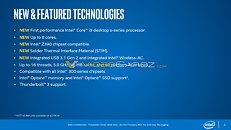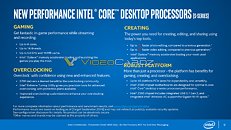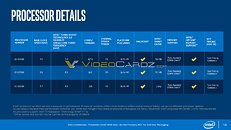Friday, August 17th 2018

Intel Confirms Soldered IHS for 9th Gen Core Series
Soldered integrated heatspreader has been a longstanding demand of PC enthusiasts for Intel's premium "K" mainstream-desktop processors. With AMD implementing it across all its "Summit Ridge" and "Pinnacle Ridge" Ryzen AM4 processors, just enough pressure for built on Intel. The company, in a leaked slide, confirmed the feature-set of its upcoming 9th generation "K" Core processors, which highlights "STIM" (soldered thermal interface material) for this chip. It shows that STIM could be exclusive to the "K" series SKUs, namely the i9-9900K, i7-9700K, and i5-9600K.
The slides also list out the clock speeds and cache sizes of the three first 9th generation desktop SKUs, confirming that the Core i7-9700K will indeed be the first Core i7 desktop SKU ever to lack HyperThreading. The TDP of the 8-core chips don't seem to breach the 95W TDP barrier Intel seems to have set for its MSDT processors. The slides also seem to confirm that the upcoming Z390 Express chipset doesn't bring any new features, besides having stronger CPU VRM specifications than the Z370. Intel seems to recommend the Z390 to make the most out of its 8-core chips.
Source:
VideoCardz
The slides also list out the clock speeds and cache sizes of the three first 9th generation desktop SKUs, confirming that the Core i7-9700K will indeed be the first Core i7 desktop SKU ever to lack HyperThreading. The TDP of the 8-core chips don't seem to breach the 95W TDP barrier Intel seems to have set for its MSDT processors. The slides also seem to confirm that the upcoming Z390 Express chipset doesn't bring any new features, besides having stronger CPU VRM specifications than the Z370. Intel seems to recommend the Z390 to make the most out of its 8-core chips.



93 Comments on Intel Confirms Soldered IHS for 9th Gen Core Series
These slides were either made when original Z390 was planned, or they ARE actually adding new stuff into it.
It says Z390 will have integrated USB 3.1 G2 and Wifi (CNVi). So at this point its hard to say what will happen.
"Leaked slides from Intel confirms soldered TIM on 9th gen unlocked processors.." would be just as fine and accurate - unlike this one.
9600K should be 6c/12t
9700K should be 8c/16t
9900K should be 10c/20t
With HEDT far beyond that starting at 16c/32t. Sigh.
I get you CPU has TWELVE "friggin threads" :laugh:, but 8600K whips it in gaming so who cares about that.
read the fine print asteriskWait and see until one of the OCers delids one
You are the cause why in 2k18 Intel is still selling 4c for 300$.
I suggest you read on what the reason for it is.www.redhat.com/en/blog/deeper-look-l1-terminal-fault-aka-foreshadow
The gamers and the majority of the consumers of these cpus, will most likely never have such situation, thus vulnerability is meaningless and turning off HT is pointless.
The next vulnerability about the 'code' from one browser tab reaching memory of the other tab may happen at the computers of the majority of these users, but again, i think it was not related to HT at all.
Besides, what stops you from closing the browser, reopening it freshly and then navigating to your bank account. Its not like people have tabs of pron open at the same time as internet bank tabs.
It was only OpenBSD that decided they preventatively disabled HT.www.itwire.com/security/83301-openbsd-disables-hyperthreading-support-for-intel-cpus-due-to-likely-data-leaks.html
Intel themselves said that disabling HT is not a mitigation.software.intel.com/security-software-guidance/insights/deep-dive-intel-analysis-l1-terminal-fault
It's fearmongering to suggest that you turn off HT as a normal consumer. If you know that you are affected by this CVE you already know what to do.
Yes, then again software patches are the only mitigation for current gen hardware.
This is twice, IIRC they said the same about some of the original smeltdown vulnerabilities or was it someone from Linux :confused:
It's not the only mitigation, but perhaps the easiest one. Software mitigation btw is OS dependent.
Again, this comes down to virtualization. Data centers are the targets which could be affected.
Malicious code may on purpose be placed in one of the guest machines and access memory of the cpu serving tens of other machines.
You REALLY need to know what to look for in this 32KB cache which is changing very fast.
Usual consumer will most likely not get affected, and i mean if a user downloaded a virus, and that virus get past the anti-virus, then nothing on earth will help protect against data theft. A simple keylogger will do a better job than SGX vulnerability.
No it's not.
I haven't seen the PoC so can't really say how they worked that out btw IIRC there were 8 bugs listed in spectre NG.
Yeah but as I said earlier, HT increases the scope of spectre, possibly even meltdown related bugs.